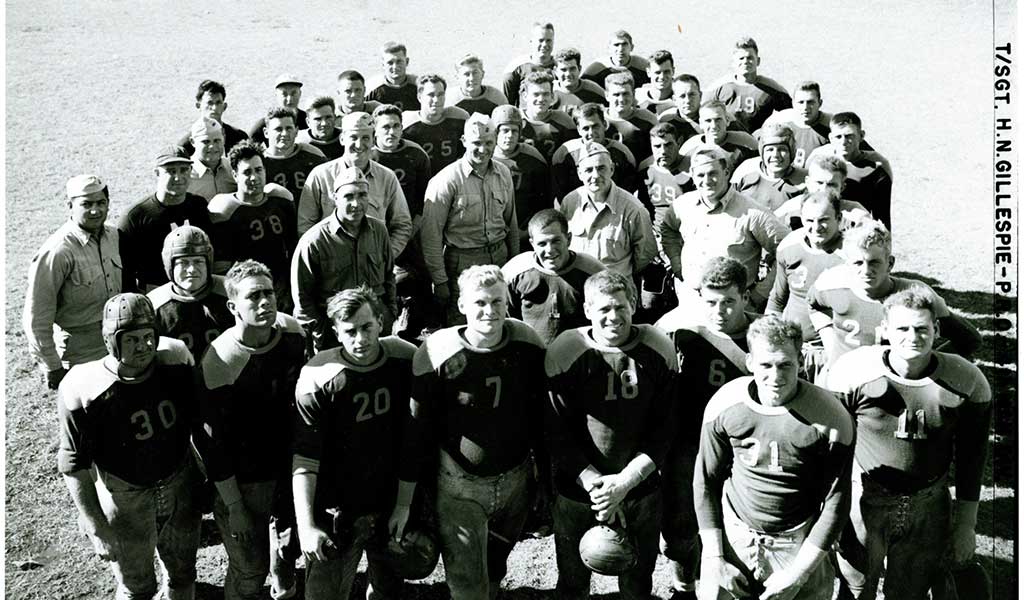Maui Marines No Ka Oi

By Lisa Potts, CWO5 USMC (Ret.)
After forming at New River (Camp Lejeune), North Carolina from October 1942 to February 1943 the Twenty Fourth Marine Regiment was activated at Camp Pendleton.
On their first Christmas under the Regimental banner, Colonel Franklin A. Hart proudly commanded – “Members of the Twenty Fourth we have trained hard since that day last March when our Regiment came into being. We have trained for a purpose. That purpose is about to be fulfilled. I know that the officers and men of the Regiment will carry the Marine Corps Banner to new heights. You will carve a niche in the hall of fame for the Twenty Fourth Marines and for yourselves; in doing so you will hasten the defeat of our enemy in the Pacific.”1
Over the next 14 months, the honors of the regiment were carved into Marine Corps history at Kwajalein (Namur), Saipan, Tinian, and to the heights of Iwo Jima. 70 years later, they returned to Camp Lejeune to retire the 4th Marine Division colors and another treasured honor – their football.
Following Roi-Namur, the Division took a respite on the island of Maui, at the foot of Haleakala. The terrain was ideally suited for training; particularly for Iwo Jima because there were all kinds of mountains and bluffs and caves. They had jungle training and a 200-target range. The machine gun range was perfect.2 There was a USO, a canteen, a movie theater, and intramural sports.
The 1600- acre encampment was divided by a gulch with the infantry area to the east and the Headquarters area to the west. The inter-regimental football league was established. The East Side Gulchers in red jerseys coached by Major Frank Garretson (University of Washington) and LT (MC) Carmen I. Razzano (Michigan) played against the West Side Gulchers in the blue jerseys coached by Lt. Sam Mandich (West Virginia University) and LT(MC) Irah D. Hardy (All American, Harvard 1931). LtCol “Pat” Hanley3 was in charge of morale and welfare. He saw great promise in the teams.
Major General Clifton B. “I Will Hold” Cates assumed command of the 4th Marine Division in June 1944. When the Division returned from Tinian, Hanley asked Cates4 to enter a team in the Pacific Championship football league. Cates replied “’Pat, we can’t hold a candle to the Air Corps and the Navy and the Army. They’ve got All-Americans on their team. We have a bunch of college boys, but very few of those.” But Hanley was confident. He went over to the league meeting, “and they practically laughed at him. They said, ‘You can’t stand up against these other teams.’” They finally agreed to let the Division play in the league, but the games were not to count in the championship.5
The location of the 4th Marine Division was highly secreted, so the team was identified only as 11 men coached by Pat Hanley, the “Maui 11,” or “Maui Marines.” Trials were held for members of both the East and West Gulchers to create one team to represent the Division. Four members were unit commanders.6 Over the next three months they outscored their opponents 164 – 6. As the season neared an end, the championship game was set between the star-studded Seventh Army Air Force Bombers and the crack Kaneohe Klippers. The people of Maui rallied for a match between the 7th AAF and Maui Marines. They took their case to the local papers. “We fail to see how the Klippers (who were beaten by them) and the Bombers (who did not play them) can justly claim the CPA title over the Maui Leathernecks.” 7
The match between the Bombers and Maui Marines would not happen. The 4th Marine Division was called into action. They carried with them the high spirit of Maui; every 10 yards advanced reported on the intra-battalion messages as a “First down” and every objective achieved as “Touchdown (one, two,..). En route to Iwo Jima, the team publicist and game day announcer, Combat Correspondent Sergeant John Barberio, penned one more dispatch revealing the team’s identity.8 He, and four other members of the team, were among the fallen Marines at Iwo. Many others were among the wounded. The hard-hit 4th Marine Division returned to a big ALOHA from the people of Maui. “… welcome back to all the folks on Maui who think it might be a pretty good idea to add a new word to the famous slogan MAUI NO KA OI [Maui is the best] and let the world know it is now, MAUI MARINES NO KA OI!9
The museum proudly exhibits the Maui Marine football that preserves the story of the winning spirit of the Fighting Fourth and the Navy Cross, Silver Stars, Bronze Stars, purple hearts, and the fallen members that signed that ball in 1944. To learn more of the heroism of the Maui Marines on Iwo, I highly recommend David Sears’ article “Ghost Team of Island X” cited below.
1 Franklin A. Hart, Colonel, U.S. Marine Corps, “Christmas Greetings to the Officers and Men of the Twenty Fourth Marines,” December 25, 1943.
2 Oral History transcript of General Clifton B Cates, U.S. Marine Corps (Retired), Benis M. Frank, Interviewer, Historical Division, Headquarters, U.S. Marine Corps, Washington D.C., Forward by E. H. Simmons, BGen, USMC (Ret)., 26 April 1973. Gen Clifton B_ Cates.pdf (usmcu.edu)
3 LtCol LeRoy B. “Pat” Hanley was one of the famed Hanley brother football players at Washington State, played in the 1919 Rose Bowl on the Mare Island team, and was the coach of Boston University from 1934 – 1941.
4 Oral History Interview, 26 April 1973. Gen Clifton B_ Cates.pdf (usmcu.edu)
5 Ibid. Gen Clifton B_ Cates.pdf (usmcu.edu)
6 David Sears . “Ghost Team of Island X,” Naval History Magazine, Vol 29, No 1, February 2015.
7 Red McQueen, “Hoomalimali (Kid ‘em along),” Sports Commentary, Honolulu Advertiser, November 27, 1944.
8 Lt. Jim C. Lucas and Sgt. John M. Barberio of the Marine Corps, combat correspondent, “Pat Hanley’s Hero Eleven Now Battling Japs on Iwo,” UP (En route to Iwo Jima, No Date).
9 Unk, “Camp Maui Welcome Home pamphlet,”1945.
Posted on June 9, 2023

